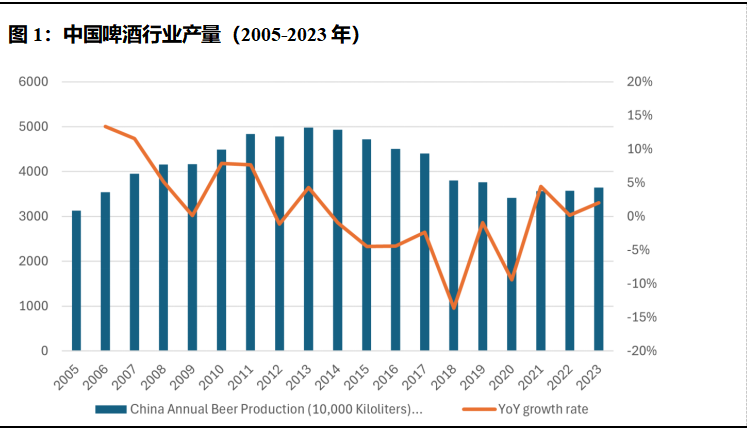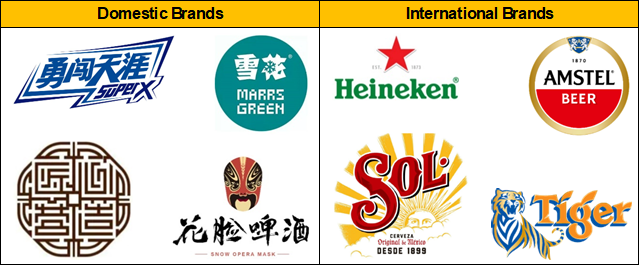Introduction: Navigating an Industry Turning Point
By 2016, China’s beer industry had hit a turning point. After years of rapid growth, production peaked at 50 million kiloliters in 2013. Market dynamics shifted significantly as younger consumers, particularly Gen Z, moved toward premium, experiential, and craft-style beers. Meanwhile, global beer giants like AB InBev and Heineken were aggressively expanding their premium portfolios in China, intensifying competition.
简介:引领行业转折点
到2016年,中国的啤酒行业已经达到了一个转折点。经过多年的快速增长,产量在2013年达到了5000万千升的峰值。随着年轻消费者,尤其是Z世代,转向高端、体验式和精酿啤酒,市场动态发生了显著变化。与此同时,百威英博和喜力等全球啤酒巨头正在积极扩大其在中国的高端投资组合,从而加剧了竞争。
Figure 1. The Beer Industry Output in China (2005-2023)
Source: National Bureau of Statistics, IMD China 资料来源:中国国家统计局
For China Resources Beer (CR Beer), China’s largest brewer by volume, the shifting market dynamics represented not just a challenge but an existential threat. Its flagship brand, Snow Beer, had become China’s top-selling beer through scale and aggressive pricing, but this approach had become unsustainable. Internally, the company grappled with operational inefficiencies, weak positioning in the premium segment, and an aging, costly workforce—issues newly appointed CEO Hou Xiaohai called the “Three Mountains.”Source: National Bureau of Statistics, IMD China 资料来源:中国国家统计局
对于中国销量最大的啤酒酿造商华润啤酒来说,不断变化的市场动态不仅是一个挑战,而且是一个生存的威胁。它的旗舰品牌“雪花”,通过规模扩张和积极的价格策略,已经成为中国最畅销的啤酒,但这种方法已经变得不可持续。在内部,该公司努力应对运营效率低下、在高端领域份额薄弱以及员工老龄化、高成本的问题。新任命的首席执行官侯孝海称之为“三座大山”。
Hou understood that that transformation was essential, believing that:
"Transformation is about adapting to new consumer trends, industry cycles, and societal shifts. To succeed, companies must align with changing consumer behaviors and economic realities".
This insight became the cornerstone of CR Beer’s ambitious “3+3+3” nine-year strategy, initiated in 2017 under Hou’s leadership. Designed as a phased transformation, the strategy aimed to systematically address the company’s core challenges while building long-term competitiveness. It would prove to be a defining journey for both CR Beer and Hou Xiaohai himself.
侯孝海明白在这种情形下,变革是必要的,他相信:
“变革是为了适应新的消费者趋势、行业周期和社会转变。要想取得成功,公司必须与不断变化的消费者偏好和当下的经济现实保持一致。”
这一见解最终演变成为华润啤酒雄心勃勃的“3+3+3”战略,该战略于2017年在侯孝海的领导下启动。该战略设计为分阶段转型,旨在系统地解决公司的核心挑战,同时建立长期竞争力。这将被证明是华润啤酒和侯孝海本人的一个非常关键的决策。
Laying the Foundation: Structural and Cultural Reset
Before pursuing further growth, CR Beer recognized the necessity of addressing fundamental inefficiencies and aligning its corporate culture. Reinventing a strong brand first requires building a robust foundation through capacity optimization and organizational restructuring.
坚实基础:组织与文化重塑
在追求进一步的增长之前,华润啤酒认识到首先要从根本上解决效率低的问题并开展企业文化重塑的必要性。重塑强势品牌首先需要通过能力优化和组织重塑建立坚实的基础。
In 2017, Hou convened 100 senior executives at CR University’s Xiaojingwan Campus, initiating an ambitious restructuring. The company streamlined its operations, consolidating breweries from 98 to 63, significantly reducing inefficiencies and boosting productivity. Workforce optimization reduced headcount from 58,200 to 25,000, accompanied by a 47% wage increase to retain essential talent. Concurrently, CR Beer launched a digital overhaul, led by Guo Hua, a former IBM and Accenture executive, to enhance supply chains, intelligent manufacturing, and digital marketing capabilities.
2017年,侯孝海在华润大学小径湾校区召集了100名高管,启动了这个雄心勃勃的计划。该公司精简了组织,将啤酒厂从98家整合到63家,显著改善了低效问题,提高了生产率。将员工人数从58200人减少到25000人,同时工资增加47%,以留住优秀人才。与此同时,华润啤酒发起了一项由IBM和埃森哲前高管郭华领导的数智化改革,以增强供应链、智能制造和数字营销能力。
Hou recognized, however, that sustainable transformation required cultural change. In 2018, the Corporate Culture Reshaping Project engaged over 26,000 employees, embedding a new philosophy: “Every Individual Matters, Every Bottle Shines.” This approach was integrated into performance evaluations, leadership development, and daily operations, creating alignment throughout the organization.
By 2021, CR Beer had a leaner operational structure and a culturally empowered workforce, setting the stage for its brand reinvention.
然而,侯孝海认识到,可持续的变革需要文化的变革。2018年,企业文化改造项目覆盖了2.6万多名员工,嵌入了一种新的理念:“每一个人都不简单,每一瓶酒才放光彩。”这种方法被整合到绩效评估、领导力发展和日常操作中,在整个组织中创建了一致性。
到2021年,华润啤酒的组织结构更精简,文化认同度更高,为其品牌重塑奠定了基础。
Reinventing the Brand: Capturing the New Generation
Following structural reforms, CR Beer turned its attention to brand innovation and premiumization. Recognizing younger consumers sought meaningful experiences, Hou led a comprehensive rebranding under the banner “We made for young.”
Central to this strategy was the revitalization of Yongchuang Tianya SuperX, positioned to resonate strongly with youth culture. CR Beer invested significantly in influencer marketing, music festivals, and high-profile events like the XGames, deeply embedding SuperX into China's dynamic lifestyle scene. The results were swift and impressive—sales targets quickly doubled, affirming CR Beer's ability to dominate the premium segment and engage a new generation of consumers.
品牌重塑:抓住新生代
经过结构改革,华润啤酒将注意力转向品牌创新和高端化。认识到年轻消费者寻求有意义的体验,侯孝海在“We made for young”的旗帜下领导了一次全面的品牌重塑。
这一战略的核心是振兴勇闯天涯SuperX,使其能够与青年文化产生强烈共鸣。华润啤酒在网红营销、音乐节和XGames等知名活动上投入了大量资金,将SuperX深深融入到中国充满活力的生活环境中。结果是迅速而令人印象深刻——销售目标迅速翻了一番,进一步肯定了华润啤酒主导高端市场并吸引新一代消费者的能力。
Strategic Partnership with Heineken: Accelerating Premiumization
As CR Beer focused on developing its premium portfolio, Hou saw an opportunity to accelerate growth through a global alliance.
“Rather than exporting Chinese beer, we should first bring in top international brands, collaborate, and refine our approach,” he explained, setting the stage for CR Beer’s next major move.
In 2018, CR Beer forged a long-term strategic partnership with Heineken, securing exclusive distribution rights for Heineken products across Mainland of China, Hong Kong, and Macau. Under the agreement, Heineken acquired a 20.7% stake in CR Beer, while CR Beer took a 0.9% stake in Heineken Group.
与喜力的战略合作伙伴关系:加速高端化
随着华润啤酒专注于开发其高端产品组合,侯孝海看到了通过联合国际品牌加速增长的机会。
他解释说:“与其输出中国品牌,我们更应该首先引进顶级国际品牌,通过合作来完善我们的打法”,这为华润啤酒的下一个重大举措奠定了基础。
2018年,华润啤酒与喜力建立了长期的战略合作伙伴关系,确保了喜力产品在中国大陆、香港和澳门的独家分销权。根据协议,喜力收购了华润啤酒20.7%的股份,而华润啤酒则收购了喜力集团0.9%的股份。
This partnership immediately strengthened CR Beer’s position in the premium segment, leveraging Heineken’s global reputation and integrating its products into CR Beer’s extensive distribution network. For Heineken, the agreement provided a significant re-entry into the Chinese market, where its share had fallen to just 0.4% by 2017. By the end of 2023—the final year of their first five-year plan post-merger—Heineken’s sales in China reached 600,000 tons, a fourfold increase, making China Heineken’s second-largest global market.
Building on this momentum, CR Beer introduced the “4+4” brand matrix, blending four domestic brands - Yongchuang Tianya SuperX, Marrs Green, Craftsmanship, and Flower Face with four international brands - Heineken, Red Baron, Tiger, and SOL. This balanced strategy effectively addressed diverse consumer segments, reinforcing CR Beer’s position in China's premium beer market.
这一合作伙伴关系很快加强了华润啤酒在高端领域的地位,利用了喜力的全球声誉,并将其产品整合到华润啤酒广泛的分销网络中。对喜力来说,该协议将显著地提升在中国市场销量,到2017年,喜力在中国市场的市场份额已经降至0.4%。
到2023年底,即合并后第一个五年计划的最后一年,喜力在中国的销量达到60万吨,增长了四倍,使中国成为喜力的第二大全球市场。
基于这一势头,华润啤酒推出了“4+4”品牌矩阵,融合了四大国内品牌——勇闯天涯SuperX、马尔思绿、匠心营造和脸谱,以及喜力、红爵、Tiger和苏尔。这种平衡的策略有效地解决了不同消费者群体的需求,强化了华润啤酒在中国优质啤酒市场的地位。
Figure 2. CR Beer’s 4+4 Brand Matrix 图2:华润啤酒4+4品牌矩阵
Source: CR Beer, IMD China 来源:华润啤酒,IMD中国
Beyond Beer: CR Beer’s Bet on Baijiu
Having navigated multiple economic cycles—expansion, market saturation, and fluctuating demand—CR Beer recognized the necessity to Limited diversification beyond beer. In 2020, the company established CR Liquor, a wholly owned subsidiary, signaling a strategic move into the high-margin Baijiu market. Through targeted acquisitions, CR Beer secured significant stakes in prominent Baijiu producers—40% in Shandong Jingzhi, 49% in Anhui Jinzhongzi, and 55.19% in Guizhou Jinsha Jiaojiu—between 2021 and 2022.
多元发展: 华润啤酒投资白酒领域
在穿越了多个经济周期——扩张、市场饱和和需求波动之后——华润啤酒认识到在啤酒之外实现有限多元化的必要性。2020年,该公司成立了全资子公司华润酒业,标志着其向高利润白酒市场的战略进军。通过有针对性的收购,华润啤酒在2021-2022年期间获得了知名白酒生产商的大量股份——山东景芝白酒40%股权,安徽金种子酒业49%股权,贵州金沙窖酒55.19%股权。
By employing a dual empowerment strategy, CR Beer effectively integrated its beer and Baijiu businesses, capitalizing on synergies across distribution, operations, and branding. This strategic alignment reinforces the company’s position in the premium alcohol sector and supports its ambitious vision of "leading the new world of beer" and "exploring the new world of Baijiu."
With industry giants Moutai and Wuliangye dominating Baijiu, CR Beer faces intense competition. However, if its beer transformation is any indication, the company is well-positioned to make its mark.
通过采用啤白双赋能战略,华润啤酒有效地整合了其啤酒和白酒业务,利用了分销、营运和品牌之间的协同效应。这种战略结合加强了该公司在高端白酒行业的地位,并支持了其“引领啤酒新世界”和“探索白酒新世界”的愿景。
随着行业巨头茅台和五粮液开始主导白酒市场,华润啤酒面临着激烈的竞争。然而,按照其啤酒业务的转型经验,该公司完全有能力在白酒市场有所作为。
Delivering Results: A Transformation That Paid Off
By 2024, CR Beer’s strategic transformation was delivering clear, measurable results. As the company celebrated its 30th anniversary, it showcased not just longevity, but successful reinvention. Premium beer sales volume surged, with Heineken up nearly 20%, Lao Xue and Amstel sales doubling, and ultra-premium brand Nong Li increasing by 35%. From 2020 to 2024, CR Beer’s total revenue grew by 22.85%, and net profit soared by 126.3%. Additionally, its beer market share increased, with premium beer sales reaching 2.5 million tons, positioning the company among the industry leaders.
交付结果:一场成果丰硕的变革
到2024年,华润啤酒的战略转型取得了清晰、可衡量的结果。在该公司庆祝成立30周年之际,它不仅展示了其持久的生命力,还展示了成功的变革。高端啤酒销量飙升,喜力增长近20%,老雪和红爵销量翻倍,超高端品牌醲醴增长35%。2020年至2024年,华润啤酒的总收入增长了22.85%,净利润飙升了126.3%。此外,其啤酒市场份额有所增加,高档销量达到250万吨,使该公司跻身行业领导者之列。
CR Beer’s expansion into Baijiu also gained significant momentum, generating RMB 2.149 billion in revenue, driven by a 35% increase in sales of its flagship product, Zhaiyao, which accounted for over 70% of Baijiu revenues.
For Hou Xiaohai, these results solidified his industry standing. His strategic vision and execution earned him the 2024 Ram Charan Management Practice Award for Transformational CEOs and recognition in the Leaders 50 Global Business Leaders list. His leadership approach became a benchmark for driving transformative change.
华润啤酒向白酒领域的扩张也获得了显著的势头,收入为21.49亿元,这得益于其旗舰产品摘要的销售额增长35%,占白酒收入的70%以上。
对于侯孝海来说,这些结果巩固了他的行业地位。他的战略愿景和执行为他赢得了“2024拉姆·查兰管理实践奖-变革型CEO”,并在Leaders 50全球商业领袖名单中获得认可。他的领导方式成为了推动变革的基准。
As CR Beer moves into the final phase of its “3+3+3” strategy in 2025, chairman Hou Xiaohai introduced the “Three Precision” model—emphasizing a streamlined organizational structure, rigorous cost optimization, and operational excellence. This new model is designed to sharpen the company’s competitive edge, enhance profitability, and drive sustainable growth in an increasingly challenging market.
With this strategic focus, the crucial question now is whether CR Beer can replicate its successful beer transformation in China’s fiercely competitive Baijiu market.
随着华润啤酒在2025年进入“3+3+3”战略的最后阶段,董事会主席侯孝海推出了“三精管理”模式——强调精简的组织结构、精益成本优化和精细业务操作。这种新模式旨在提高公司的竞争优势,提高盈利能力,并在一个日益具有挑战性的市场中推动可持续增长。
有了这一战略焦点,现在的关键问题是,华润啤酒能否在中国竞争激烈的白酒市场复制其成功的啤酒业务转型。
Business Lessons: Key Takeaways for Global Leaders
CR Beer’s transformation provides key insights for business leaders managing market shifts and disruptions:
Transformation takes time and discipline – Sustainable transformation requires a solid foundation and a long-term perspective.
Culture and people matter as much as strategy – Structural adjustments alone fall short without cultural alignment. Engaging employees and aligning them with the vision ensures lasting change.
Digital readiness is vital – Investments in technology, digital marketing, and e-commerce enable swift adaptation to evolving consumer preferences, particularly among younger demographics.
Strategic partnerships accelerate growth – Well-chosen alliances can significantly accelerate entry into new market segments, emphasizing the value of strategic collaborations.
Diversification is a calculated risk – CR Beer’s expansion into Baijiu highlights the potential benefits and risks of strategic diversification.
CR Beer’s journey is more than a turnaround—it exemplifies strategic foresight, meticulous execution, and bold adaptability.
商业课程:对全球领导者的关键收获
华润啤酒的转型为商业领袖应对市场变迁与行业颠覆提供了关键启示:
转型需要时间和纪律——可持续的转型需要一个坚实的基础和一个长期的视角。
文化和组织和战略一样重要——如果没有文化一致性,结构调整就不够。吸引员工,并使他们与愿景保持一致,以确保了持久的改变。
数智化至关重要——对技术、数字营销和电商的投资能够迅速适应不断变化的消费者偏好,特别是在年轻人群中。
战略伙伴关系加速增长——精心选择的战略伙伴可以显著加速进入新的细分市场,这强调战略合作的价值。
多元化发展是一种经过计算的风险——华润啤酒向白酒的扩张突出了战略多样化的潜在好处和风险。
华润啤酒的旅程不仅仅是一次变革——它体现了战略远见、细致的执行和大胆的适应性。
瑞士IMD国际管理发展学院成立于1946年,总部位于瑞士洛桑,在新加坡设立了亚洲校区,在深圳和开普敦设有分部。作为全球顶尖商学院,每年有120 多个国家的 19,000 多名高管在此学习,2,000 多家组织委托其培养领导人才。并在全球180多个国家拥有超145,000名校友构建起强大人脉网络。2024 年,IMD的公开课和定制课程均跻身全球前十。其 MBA项目表现卓越,在彭博社2024 - 2025年度排名中居欧洲第一,在Poets&Quants 2024 - 2025 年、2025 年《金融时报》排名中也名列前茅。2024 年,IMD的EMBA项目在《金融时报》排名中,欧洲第8、全球第17,多项标准位居前列。
2024年,正值华润啤酒30周年之际,瑞士IMD国际管理发展学院就华润啤酒“组织变革”工作开发商业案例《华润啤酒:厉兵秣马,备战未来》,系统性研究华润啤酒于“商业新世界”中,在战略、组织、文化等方面的变革。本期内容转自IMD官网《华润啤酒的大胆赌注——为中国最大的啤酒酿造商重塑未来》
免责声明:市场有风险,选择需谨慎!此文仅供参考,不作买卖依据。
关键词:






 营业执照公示信息
营业执照公示信息